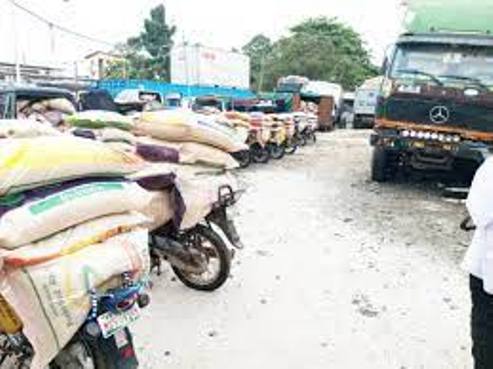
LAGOS APRIL 10TH (NEWSRANGERS)-Despite forfeiting over N10 trillion worth of goods annually, smuggling activities have continued to thrive in major towns and cities in Nigeria.
Closer surveys by our reporter revealed that cartons of foreign-made goods, which are on the federal government’s prohibition list, adorn the shelves of big and small supermarkets in major towns and cities.
Local markets are not left out as bags of foreign parboiled rice such as Tomato Arozo, cartons of frozen foreign poultry products, gallons of vegetable oil, used cloths, also known as ‘okirika’, and tyres are sold in the open market even though the federal government banned their import.
More worrisome is the rise in the importation of fake, adulterated and expired drugs into the country.
Just last Tuesday, the Federal Operations Unit Zone A, Ikeja, handed over 41 container loads of expired drugs valued at over N1.42 billion to officials of the National Agency for Food and Drug Administration and Control (NAFDAC) for destruction.
In Lagos, Daleko, Alaba Rago, Kotangowa, and Yaba markets are popular spots for the sale and distribution of smuggled rice and vegetable oil.
All the foreign-made merchandise, according to the Acting Controller of the Federal Operations Unit, Zone A, Ikeja, Hussein Kehinde Ejibunu, were smuggled into the country, through unapproved routes on motorcycles and wooden boats.
The goods, which mostly bear labels with Chinese and Japanese inscriptions, probably came from traditional smuggling ports in Asia and were landed in the neighbouring Republic of Benin, Chad and Niger Republic before being ferried into Nigeria in the dead of night at any of the thousands of coves and inlets along the coastline in Lagos and Ogun states.
Seme and Idiroko in Lagos and Ogun states are considered to be the smuggling hubs in the South West.
To the villagers along the borderline, smuggling is considered big business, despite the fact that the federal government has made laws to protect its own industries by placing the highest tariffs in the world on some of those items.
In November 2019, the Nigeria Export Processing Zones Authority (NEPZA) said N1.45 trillion worth of goods were smuggled into Nigeria annually from Benin Republic.
A few years ago, a bag of 50kg rice was sold at between N7000 and N9000, depending on the brand and quality. Right now, the same bags of rice are sold for between N35,000 and N40,000, in spite of the fact that the price remains the same in neighbouring countries.
Aside from smuggling bags of foreign rice and poultry products, the smuggling of illicit drugs and expired medications has continued to rise. Hussein Kehinde Ejibunu, acting Controller of FOU Zone A, earlier in the week handed over N1.442 billion worth of expired drugs to officials of NAFDAC.
This is aside from the N694.5 million worth of goods that the unit seized in March 2023 alone. Addressing reporters, Ejibunu said the drugs, which expired in November 2021, would have found their way into the open market, but for the reworked strategy that he implemented to block all areas of revenue leakages.
Similarly, the Controller of the Western Marine Command of the Service, Uduadu Salefu, said his command recorded a seizure of N110.2 million worth of goods being ferried into the country through the western waters.
He said among the 15 items seized were bleaching creams, 8,825 litres of petrol, 50 pairs of used tyres, 1,519 bags of rice and several parcels of seeds suspected to be Indian hemp.
Again, the rise in the business of smuggling has also put pressure on the nation’s lean foreign exchange (FX) as it calls for cash payments in foreign currency.
Interestingly, there is a strong feeling among Nigerians that made-in-Nigeria products are worthless and cannot compete with foreign goods.
During the recession in 2017, a close watch at the commercial activities across one of the nation’s land borders, Seme, showed that in the port city of Cotonou, several thousands of used vehicles littered their auto stands as Nigerians, who are the major buyers, were not seen.
In fact, most of the bars and canteens closed up as those who were the major patrons could not travel again as the recession bit harder.
In a bid to tighten the noose around smugglers, the Seme command of the service said it intercepted fake $6 million from smugglers.
Dera Nnadi, Customs Controller in charge of Seme Command, explained that the command recorded a milestone in its anti-smuggling operations with the seizure of fake $6 million currency notes. Also seized by the command were 1,160 pieces of dead rats, 1,102 pieces of dead tiny birds, 34 pieces of monkey skin, and 14 parcels of cannabis sativa.
“The phenomenon is considered one that significantly undermines economic and social developments in a society where it thrives due to its ability to reduce government revenue and state tax and also undermines the growth and development of local industries by flooding local markets with cheap smuggled products,” he said.
Daily trust
PROUDLY CONMEP










